Hot water systems are essential for our daily routines, providing us with the comfort and convenience of warm water. However, a burst hot water system is one of the most frustrating and inconvenient problems that homeowners can face. A burst can cause significant damage to your property and disrupt your daily activities. In this blog post, we will explore the causes of burst hot water systems and provide practical steps on what to do next.
I. Understanding Hot Water Systems
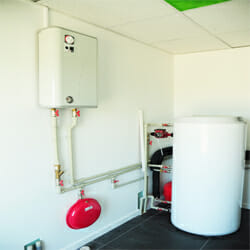
Storage Tank Systems
Storage tank systems are the traditional and most common type of hot water systems. They consist of a large insulated tank that stores and heats a specific amount of water. The tank is typically made of steel or glass-lined material to prevent corrosion and maintain the water’s temperature. Inside the tank, is a heating element, often powered by electricity or gas, which heats the water to the desired temperature.
When a hot water tap is turned on in the house, the preheated water from the storage tank is delivered through pipes to the desired location. As the hot water is used, cold water enters the tank to replenish the supply, which is then heated again to maintain the desired temperature. This continuous cycle ensures a readily available supply of hot water for household needs.
Storage tank systems are relatively simple in design and installation, making them cost-effective options for many households. However, they require regular maintenance to prevent sediment buildup, corrosion, or leaks, which can contribute to burst hot water systems.
Tankless Systems
Tankless hot water systems, also known as on-demand or instantaneous systems, have gained popularity due to their energy efficiency and space-saving design. Unlike storage tank systems, tankless systems do not store heated water in a tank. Instead, they heat water on-demand as it passes through a heat exchanger when a hot water tap is opened.
When hot water is required, the tankless system activates the heating elements, rapidly heating the water as it flows through the heat exchanger. This process eliminates the need for a storage tank, as hot water is generated instantaneously. Tankless systems can provide a continuous hot water supply as long as the demand does not exceed the system’s capacity.
Tankless systems offer several advantages, including energy savings, as they only heat water when needed, and space efficiency, as they do not require a large storage tank. However, they may have limitations regarding the volume of hot water they can deliver simultaneously.
Understanding the different types of hot water systems is crucial for identifying potential issues and implementing preventive measures. Whether you have a storage tank or a tankless system, knowing their operations and components will help you recognize signs of trouble and take appropriate actions to avoid burst hot water systems. Regular maintenance, proper installation, and prompt repairs are essential for ensuring the durability and functionality of your hot water system, regardless of its type.
Read More: Tankless for Water Heating
II. Causes of Burst Hot Water Systems
 Pressure Buildup
Pressure Buildup
A common cause of burst hot water systems is a pressure buildup within the system. Pressure can increase due to various reasons, including:
- High Water Pressure: Excessively high water pressure is a common culprit behind burst hot water systems. Municipal water supplies often deliver water at high-pressure levels to ensure adequate distribution throughout the area. However, if your home’s plumbing system is not equipped to handle such high pressures, it can strain the pipes and cause them to burst. It’s important to monitor and regulate the water pressure in your home to prevent potential damage.
- Thermal Expansion: When water heats up, it naturally expands. This expansion can lead to a rise in pressure within the hot water system. If the system lacks proper mechanisms to accommodate this expansion, such as an expansion tank or a pressure relief valve, the pressure can build up and cause pipes or fittings to burst. Thermal expansion is particularly relevant in storage tank systems, where the heated water is stored and has limited space for expansion.
Corrosion and Ageing
Corrosion and pipe ageing are significant factors contributing to burst hot water systems. Over time, exposure to minerals, sediments, and chemicals in the water supply can lead to corrosion. Corrosion gradually weakens the pipes, making them more susceptible to bursts. Additionally, ageing pipes become more prone to deterioration, increasing the risk of bursts occurring.
Corrosion can occur in both storage tank systems and tankless systems. In storage tank systems, the inside of the tank and the pipes connected to it are exposed to water for extended periods, providing more opportunities for corrosion to develop. In tankless systems, the heat exchanger and associated piping can also be affected by corrosion.
To mitigate corrosion-related bursts, it is crucial to address water quality issues. Installing water softeners or filters can help remove minerals and sediments that contribute to corrosion.
Freezing Temperatures
In colder regions, freezing temperatures pose a significant risk to hot water systems. If the water inside the pipes freezes, it can lead to bursts. This is especially problematic in areas where pipes are exposed to freezing temperatures, such as outdoor pipes or pipes in unheated areas like basements or attics.
To prevent bursts caused by freezing temperatures, consider insulating exposed pipes with pipe insulation or heat tape. Proper insulation will help protect the pipes and minimise the risk of freezing and bursting.
Improper Installation or Maintenance
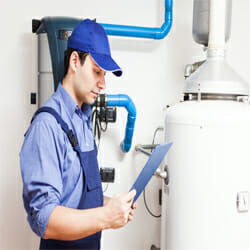
III. Signs of a Burst Hot Water System
Detecting a burst hot water system early on can help mitigate further damage. Look out for the following signs:
- Loss of Hot Water Pressure: A sudden drop in hot water pressure can indicate a burst or leak in the system. If you notice a significant decrease in water pressure when using hot water, it’s essential to investigate the cause promptly. This could be a result of a burst pipe or a leak somewhere in the system. Reduced pressure indicates that water is not flowing as it should, requiring immediate action.
- Water Discoloration: If the hot water appears rusty or discoloured, it may indicate corrosion within the pipes, increasing the risk of a burst. Discoloured water can also be a sign of sediment buildup, which can affect the system’s efficiency and integrity. Corrosion and sediment can cause the pipes to weaken, making them more prone to bursting. Additionally, discoloured water may contain harmful contaminants, so it is important to address this issue promptly for both the safety of your hot water system and your health.
- Water Leaks: Visible water leaks around the hot water system or pooling water in the surrounding areas may suggest a burst. Pay attention to any signs of water damage, such as damp walls or ceilings, as these can indicate a burst or leak. Leaks can occur at various points in the system, including pipes, valves, or fittings. Water leaks not only waste water but can also cause significant damage to your property if left unaddressed. Timely detection and repair of leaks are crucial to prevent further damage and minimise water loss.
- Strange Noises: Unusual noises, such as banging or gurgling sounds from the hot water system, can indicate pressure or pipe issues. These noises often occur when there is a sudden change in pressure, such as when a burst occurs. Banging or knocking sounds may indicate a water hammer, a phenomenon caused by a sudden stop in the flow of water due to a burst or other issues. Gurgling sounds can be a result of air in the system or water struggling to flow through a compromised pipe. These noises should not be ignored and should prompt a thorough inspection of the hot water system.
If you notice any of these signs, taking immediate action to minimise further damage and prevent potential hazards is crucial.
Related Articles:
- What to Do if Your Water Heater Is Not Heating Water?
- Gas vs Electric Hot Water
- Hot Water Tank Replacement Costs
IV. What to Do Next
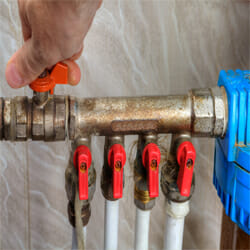
- Shut Off the Water Supply: The first step is to locate the main water shut-off valve and turn it off. This will stop the flow of water and prevent further damage. By shutting off the water supply, you will minimise the amount of water that can escape from the burst and reduce the risk of flooding or water damage.
- Turn Off the Power: Depending on the type of hot water system you have, you need to turn off the power source to ensure safety. For electric hot water systems, switch off the power at the circuit breaker that controls the water heater. If you have a gas hot water system, turn off the gas supply valve. This step is essential to prevent electrical or gas-related hazards while addressing the burst.
- Drain the System: Open all hot water taps and faucets in your home to drain the system. This will help relieve any remaining pressure and reduce the amount of water in the pipes. Start with the highest faucets in your home and work your way down to the lowest ones. Opening the taps allows water to flow out of the system, minimising the potential for additional bursts and water damage.
- Document the Damage: Take pictures or videos of the burst hot water system and any resulting water damage. Documenting the extent of the damage can be helpful for insurance purposes and when filing a claim. Make sure to capture clear images of the burst pipes, affected areas, and any visible signs of water damage. This documentation will serve as evidence and support your claim for reimbursement or coverage.
- Contact Your Insurance Provider: Notify your insurance provider about the burst hot water system and the resulting water damage. Provide them with all the necessary details, including the date and time of the incident, a description of the damage, and any documentation you have gathered. Your insurance company can guide you through the claims process and help you understand what expenses may be covered under your policy. Keep all communication and documentation related to the claim for future reference.
- Contact a Professional Plumber: After taking these initial steps to mitigate damage and ensure your safety, it is crucial to contact a professional plumber as soon as possible. A burst hot water system requires a licensed plumber’s expertise and experience to accurately assess the situation and provide the necessary repairs. Professional plumbers have the knowledge and tools to handle the repairs efficiently and effectively, restoring the system to proper working condition.
A professional plumber will have the expertise to identify the cause of the burst and recommend the necessary repairs or replacements. They will also ensure that the repairs are conducted safely, adhering to local codes and regulations. Remember, a burst hot water system is not a DIY project. It requires the expertise of a professional plumber to ensure that repairs are done correctly and safely. Attempting to fix the issue yourself without proper knowledge and experience can lead to further damage or hazards. By relying on a professional plumber, you can have peace of mind knowing that your hot water system will be repaired effectively and measures can be taken to prevent future bursts.
V. Calling a Professional Plumber
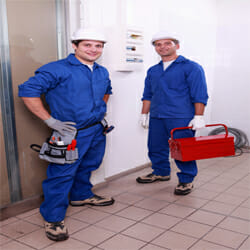
- Expertise and Experience: Professional plumbers have the knowledge and experience to accurately diagnose the cause of the burst and provide appropriate solutions. They can assess the extent of the damage and recommend the necessary repairs or replacements.
- Safety: Hot water systems involve electricity, gas, and potentially hazardous materials. A licensed plumber understands the safety protocols required for working with these systems, ensuring that repairs are conducted safely and efficiently.
- Proper Repairs: Attempting DIY repairs on a burst hot water system can lead to further damage or improper fixes. Professional plumbers have the expertise and tools to perform repairs correctly, restoring the system’s functionality and preventing future bursts.
- Code Compliance: Plumbers are familiar with local building codes and regulations. They ensure that any repairs or replacements adhere to these codes, providing you with peace of mind and avoiding potential legal issues.
By hiring a professional plumber, you can ensure that your burst hot water system is repaired effectively and that necessary measures are taken to prevent future bursts.
VI. Preventive Measures for the Future
To minimise the risk of a burst hot water system, consider implementing the following preventive measures:
- Regular Maintenance: Schedule routine maintenance with a professional plumber to inspect your hot water system, check for potential issues, and perform necessary maintenance tasks. This includes flushing the tank, inspecting valves, and addressing any signs of corrosion. Regular maintenance can help identify and address problems before they escalate into bursts.
- Install a Pressure Relief Valve: A pressure relief valve releases excess pressure from the hot water system, preventing bursts. Ensure that a qualified plumber installs and tests this valve to guarantee its effectiveness. The pressure relief valve acts as a safety measure, protecting the system from pressure buildup.
- Check and Regulate Water Pressure: Monitor the water pressure in your home. If it’s consistently high, consider installing a pressure regulator to keep the pressure within safe limits for your hot water system. High water pressure can strain the system and increase the risk of bursts.
- Insulate Pipes in Cold Weather: If you live in an area prone to freezing temperatures, insulate exposed pipes to protect them from freezing and potential bursts. Pay particular attention to pipes located in unheated areas, such as basements, attics, or crawl spaces. Pipe insulation or heat tape can help prevent freezing and reduce the risk of bursts caused by low temperatures.
Conclusion
Dealing with a burst hot water system can be a stressful experience, but understanding the causes and knowing what steps to take can help minimise damage and facilitate the repair process. Remember to shut off the water supply, contact a professional plumber, and prioritise preventive measures for the future. Regular maintenance, proper installation, and being mindful of water pressure and freezing temperatures will help safeguard your hot water system and ensure a consistent and reliable supply of warm water for your household needs. By taking proactive measures and seeking professional assistance when needed, you can prevent burst hot water systems and enjoy the benefits of a well-functioning hot water system.

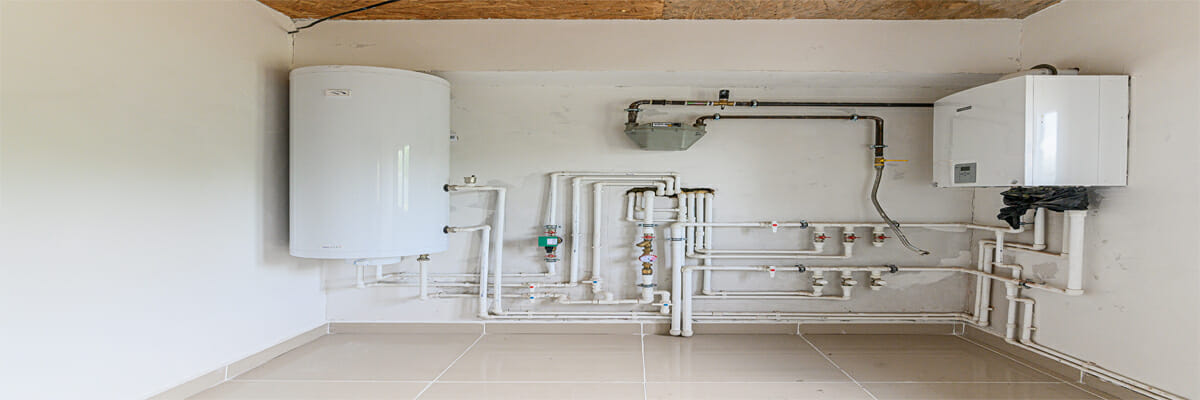
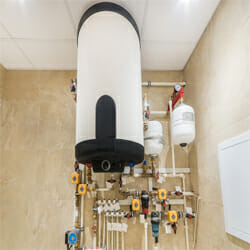 Pressure Buildup
Pressure Buildup Enquire
Enquire